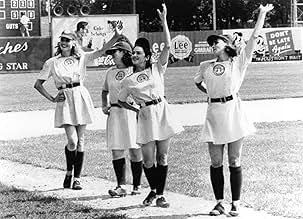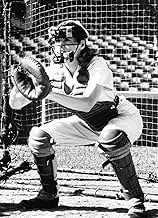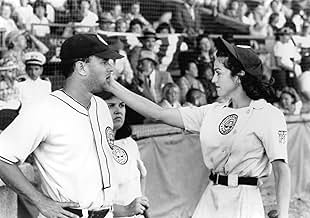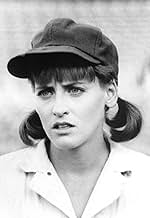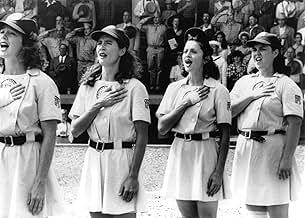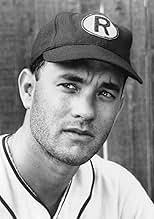Duas irmãs se juntam à primeira liga profissional feminina de beisebol e lutam para ajudá-la a ter sucesso em meio a sua rivalidade crescente.Duas irmãs se juntam à primeira liga profissional feminina de beisebol e lutam para ajudá-la a ter sucesso em meio a sua rivalidade crescente.Duas irmãs se juntam à primeira liga profissional feminina de beisebol e lutam para ajudá-la a ter sucesso em meio a sua rivalidade crescente.
- Direção
- Roteiristas
- Artistas
- Prêmios
- 6 vitórias e 13 indicações no total
- Helen Haley - First Base
- (as Anne Elizabeth Ramsay)
- LF
- (as Renee Coleman)
- …
Avaliações em destaque
During the Second World War many of America's male baseball stars were drafted into the forces, and it appeared that the nation might be deprived of its favourite sport. An entrepreneur therefore had the idea of creating an all-female baseball league. 'A League of their Own' tells the story of some of the women who played in that league.
At the centre of the drama is the rivalry between two sisters, Dottie and Kit, who sign for the same team, the Rockford Peaches. The sisters have contrasting characters. Dottie is the more talented player, but Kit is more aggressive and determined to succeed. Kit's aggression and the sibling rivalry between her and Dottie lead to dissension in the team's dressing room, and Kit is traded to a rival team, the Racine Belles. The climax of the film comes when Rockford and Racine meet in the finals of the league championship, with Kit and Dottie on opposite teams.
The film has some interesting observations about the social values of the era in which it is set. During this period there was a conflict between traditional views of femininity and the need, caused by wartime conditions, for women to take on what had historically been masculine roles. Before the war, there had been only very limited opportunities for women in professional sport; most sports, such as tennis and athletics, in which women were permitted to compete were strictly amateur. During the war, they were allowed to take part, but were still expected to conform to the ideal of being 'ladylike'. In the film, players are selected as much for their sex appeal as for their talent (Ernie Capadino, the cynical, sexist talent scout, wants to leave one player out of the team because he considers her insufficiently glamorous) and they are required to attend a 'charm school' and to conform to a strict code of sexual morality. Dottie and Kit can be seen as representing the two sides of this conflict. For all her talent, Dottie's heart is not really in professional baseball, and her real wish is to return to her old life as a housewife as soon as her husband returns from the war. Kit, on the other hand, is single, and sees the game as a way of escaping from her previously dull existence.
Although Geena Davis was quite good as Dottie, the two best performances came from two actors I had not previously heard of, Jon Lovitz in the cameo role of Ernie Capadino, and Lori Petty as Kit, who brought out the fierce determination and will to win of her character. I am surprised that she has not gone on to become a bigger star than she has. It was interesting to see Madonna (normally found in starring roles) in a supporting role as Mae, one of the Peaches who rebels against the strict moral code.
Tom Hanks stars as Jimmy Dugan, the coach of the Rockford Peaches, in a role created largely because the filmmakers felt that they needed a big male star. Dugan was himself a famous baseball player in his time, but his career was wrecked by his heavy drinking. At the beginning of the film, Dugan is played as a figure of fun, making blunders such as urinating in front of the women, but being too drunk to notice or to care. Later on, Dugan sobers up and develops into a mixture of inspirational coach and dispenser of homespun philosophy along the lines of 'There's no crying in baseball'. At neither stage, however, does the film bring out the genuinely tragic aspects of Dugan's fall from grace as a great, or potentially great, athlete ruined by alcoholism. (One can think of modern parallels such as George Best or Diego Maradona). The actor may be at fault here; during the early part of his career Hanks always seemed a limited actor, convincing in 'Mr Nice Guy' roles but unable to portray more unsympathetic characters. ('Bonfire of the Vanities' being another example).
There were one or two other things about the film that I did not like. I felt we should have seen more of Kit between her transfer to Racine and her reappearance in the finals. The opening and closing scenes, showing a reunion of the surviving players more than forty years later, did not add much to the story. (They did, however, correct the misleading impression given in the rest of the film that women's professional baseball came to an end with the war; in fact, it survived until 1954). Overall, however, this was an entertaining film, well worth watching. 7/10.
When World War II threatens to shut down Major League Baseball, candy manufacturing magnate Walter Harvey decides to create a women's league to make money. Ira Lowenstein is put in charge of public relations and scout Ernie Capadino is sent out to recruit players. Capadino likes what he sees in catcher Dottie Hinson. She's a terrific hitter and he offers her a tryout, but the married woman is content where she is, working in a dairy and on the family farm in Oregon while her husband is away at war. He's less impressed with her younger sister, pitcher Kit Keller, who loves the game passionately but appears to be less talented. He finally lets her come along when she persuades Dottie to give it a try for her sake. When the trio arrive at the tryouts in Chicago, they meet Doris and Mae. They make it onto the team, The Peaches who are managed by drunkard former baseball great Jimmy Dugan. Jimmy initially treats the whole thing as a joke, leaving the managerial duties to Dottie. However, he takes over when he sees how hard and well his team plays. The league attracts little interest at first. With a Life magazine photographer in attendance, he asks them to do something spectacular. When a ball is popped up behind home plate, she catches it while doing splits; the resulting photograph makes the cover of the magazine. More and more people show up and the league becomes a huge success.
The acting is absolutely superb, we have actors on top of their game, Tom Hanks who delivers the memorable "There's no crying in baseball!" speech. Geena Davis who was a great heroine as the star of the league who just wants her husband home from the war but is hanging onto the league for her little sister's sake. Even Madonna and Rosie O'Donnell are great together and have awesome chemistry as best friends Mae and Doris. This is one of those chick flicks that everyone has to see because it worked on every level. Penny Marshall truly brought out the pain these girls had to go through to be taken seriously. The ending always gets me in tears I have to admit, just knowing that these girls hung in there and stayed strong when everyone told them that girls couldn't play ball, let's hope that one day they'll have the opportunity again.
10/10
Você sabia?
- CuriosidadesDuring filming of the World Series games, stars took turns entertaining the unpaid extras. Tom Hanks did puppet shows over the dugout, Rosie O'Donnell did stand-up comedy; and various actors pretended to be Madonna and sang her songs after the singer balked at performing for the fans.
- Erros de gravaçãoThe end of the film notes that the players of the AAGPBL were "the first women ever to be inducted into the Baseball Hall of Fame." Actually, they are not inductees. Rather, they were recognized with a permanent exhibit in the National Baseball Hall of Fame and Museum, entitled "Women in Baseball," in 1988. The first woman to actually be inducted into the Baseball Hall of Fame was Effa Manley, the co-owner (with her husband, Abe) of the Newark Eagles. She was inducted in 2006.
- Citações
Jimmy Dugan: Taking a little day trip?
Dottie Hinson: No, Bob and I are driving home. To Oregon.
Jimmy Dugan: [long pause] You know, I really thought you were a ballplayer.
Dottie Hinson: Well, you were wrong.
Jimmy Dugan: Was I?
Dottie Hinson: Yeah. It is only a game, Jimmy. It's only a game, and, and, I don't need this. I have Bob; I don't need this. At all.
Jimmy Dugan: I, I gave away five years at the end my career, drinking. Five years. And now there isn't anything I wouldn't give to get back any one day of it.
Dottie Hinson: Well, we're different.
Jimmy Dugan: This is chickenshit, Dottie, if you want to go back to Oregon and make a hundred babies, great, I'm in no position to tell anyone how to live. But sneaking out like this, quitting, you'll regret it for the rest of your life. Baseball is what gets inside you. It's what lights you up, you can't deny that.
Dottie Hinson: It just got too hard.
Jimmy Dugan: It's supposed to be hard. If it wasn't hard, everyone would do it. The hard... is what makes it great.
- Cenas durante ou pós-créditosShots of the real AAGPBL old-timers playing baseball.
- Versões alternativasParamount Network broadcasts in the US speed up at the audio at only 2%.
- Trilhas sonorasThis Used to Be My Playground
Written and Produced by Madonna and Shep Pettibone
Performed by Madonna
Courtesy of Sire Records
Principais escolhas
- How long is A League of Their Own?Fornecido pela Alexa
Detalhes
- Data de lançamento
- País de origem
- Idioma
- Também conhecido como
- Un equipo muy especial
- Locações de filme
- Empresas de produção
- Consulte mais créditos da empresa na IMDbPro
Bilheteria
- Orçamento
- US$ 40.000.000 (estimativa)
- Faturamento bruto nos EUA e Canadá
- US$ 107.533.928
- Fim de semana de estreia nos EUA e Canadá
- US$ 13.739.456
- 5 de jul. de 1992
- Faturamento bruto mundial
- US$ 132.440.069
- Tempo de duração2 horas 8 minutos
- Cor
- Mixagem de som
- Proporção
- 2.39 : 1
Contribua para esta página








